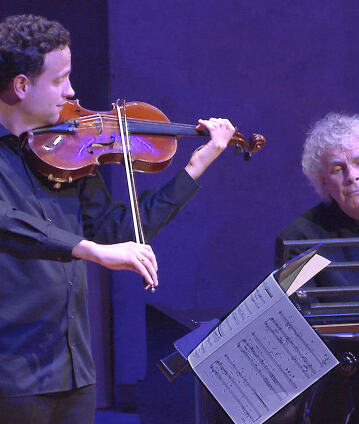“Late Night” concert with Simon Rattle

In the world of music, people know Don Quixote primarily in Richard Strauss’s powerful interpretation. With Manuel de Falla’s El retablo de maese Pedro, our Late Night concert with Simon Rattle presents a portrayal more characterised by humour and Spanish atmosphere. Besides this work, there is chamber music by Claude Debussy and Betsy Jolas of a bittersweet mood similar to the story of the “Knight of the Sad Countenance”.
Manuel de Falla, born in Cádiz in 1876, allegedly once said that “narrow-minded nationalism” was one of the things that disgusted him even during the years he had studied in Madrid. The composer received new artistic impulses when he relocated in 1907 to France, where he made the acquaintance of Claude Debussy, Maurice Ravel, Paul Dukas and Igor Stravinsky, among others. The exchange with them and the cosmopolitan climate of the music city Paris contributed to de Falla’s musical development, and soon helped him grow into the “most European among the Spanish composers, and the most Spanish among the European” ones (Gerth-Wolfgang Baruch).
That the music of his Spanish homeland remained an important source of inspiration despite the impulses he got from French impressionism is demonstrated not least by his short opera El retablo de maese Pedro, based on an episode from Miguel de Cervantes’s Don Quijote and composed in Paris in 1923. In this charming composition the melancholy knight is for once tilting not at windmills, but rather at puppets in a puppet theatre.
Before this work, which will be interpreted by members of the Berliner Philharmoniker and three vocal soloists conducted by Simon Rattle, you can hear the Sonata for flute, viola and harp by de Falla’s contemporary Claude Debussy, about which the composer once said that, given its ambivalent tonality, he himself did not know whether one should laugh or cry – perhaps both at the same time.
The centre of this late-night concert will be two premieres by French composer Betsy Jolas, highly regarded for decades as a pedagogue, particularly in the USA: Épisode sixième for solo viola and Ruht wohl for viola and piano. The soloist is the Philharmoniker’s 1st principal violist Máté Szűcs.
© 2016 Berlin Phil Media GmbH
Category
Artists
Our recommendations
- “Late Night” concert with Simon Rattle and Barbara Hannigan
- Barbara Hannigan and Simon Rattle with “Façade” by William Walton
- Paul Whiteman’s greatest hits with Simon Rattle and Max Raabe
- “Late Night” concert with Simon Rattle and Magdalena Kožená
- Simon Rattle conducts a “Late Night” concert à la française
- “Late Night” concert with Simon Rattle and Katia and Marielle Labèque